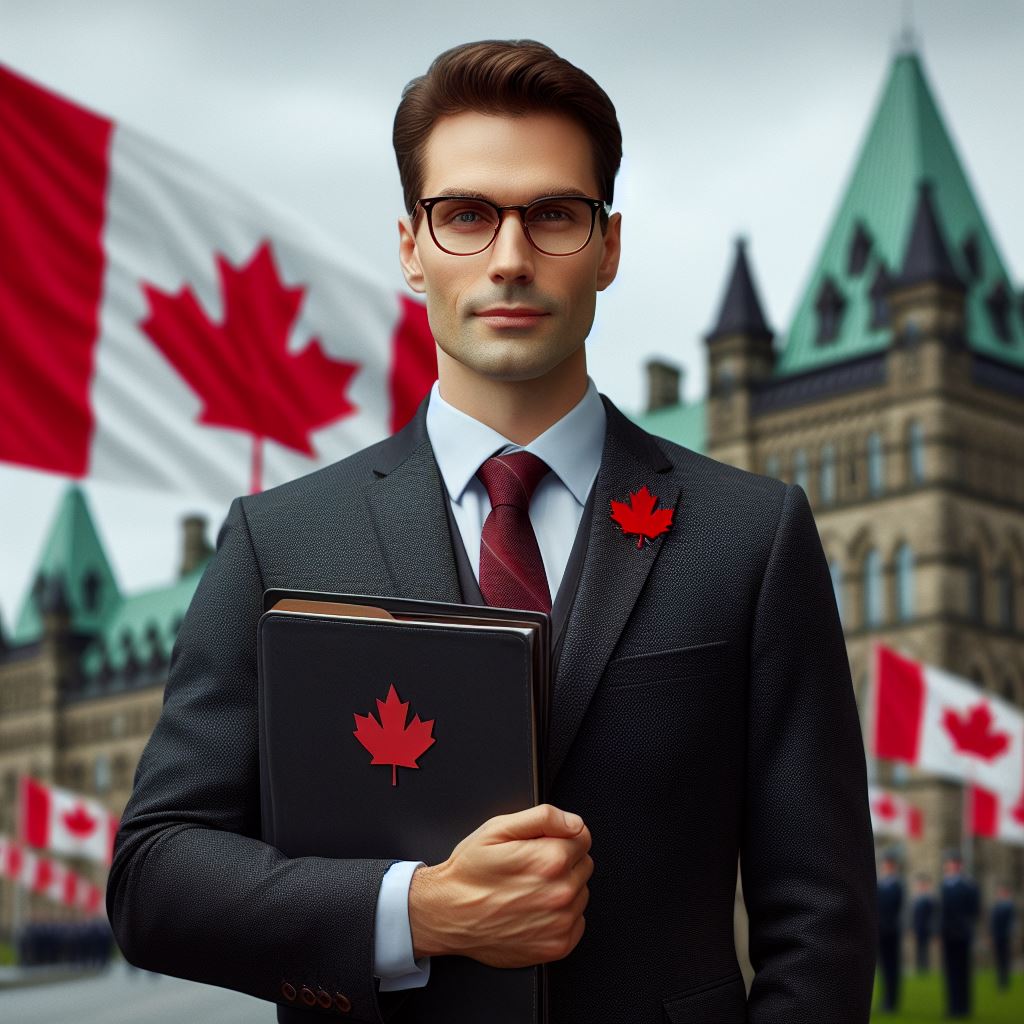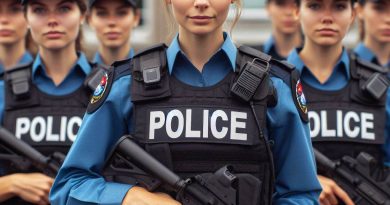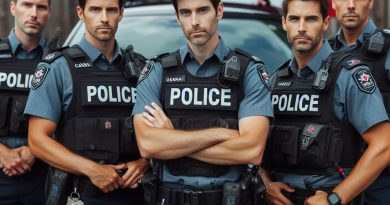How to Become a Diplomat in Canada: A Guide
Last Updated on January 11, 2024
Introduction
A diplomat is a representative of a country who engages in diplomatic activities.
Diplomacy is crucial for fostering relationships and resolving conflicts in the global arena.
The purpose of this blog post is to provide a comprehensive guide on becoming a diplomat in Canada.
Embarking on a diplomatic career in Canada is a compelling journey marked by the nuanced artistry of international relations.
This comprehensive guide not only illuminates the intricate path aspiring diplomats tread but also explores the dynamic landscape of diplomatic endeavors.
From academic pursuits to the cultivation of essential skills, we unravel the layers of preparation required for those seeking to represent Canada on the global stage.
Delve into the multifaceted world of diplomacy with us as we navigate the complexities, challenges, and profound responsibilities that come with the pursuit of becoming a distinguished Canadian diplomat.
Together, let’s chart the course towards fostering meaningful connections, promoting diplomacy, and contributing to the ever-evolving tapestry of global relations.
Education and qualifications
The educational requirements to become a diplomat in Canada
To become a diplomat in Canada, a solid educational foundation is crucial. Key requirements include:
- A bachelor’s degree in fields like international relations, political science, or public policy.
- Strong academic performance, showcasing dedication to the field of diplomacy.
The importance of obtaining a bachelor’s degree in a relevant field such as international relations, political science, or public policy
The significance of a bachelor’s degree cannot be overstated.
It provides essential knowledge and skills, preparing individuals for the diplomatic realm.
- Courses in international relations foster a deep understanding of global affairs.
- Political science studies lay the groundwork for comprehending governmental structures and policies.
- Public policy courses instill analytical and decision-making skills vital for diplomatic roles.
The need to develop strong language skills, particularly in English and French
Language proficiency is a cornerstone of diplomatic success. Fluency in English and French is particularly vital.
- Effective communication in these official languages enhances collaboration and diplomatic effectiveness.
- Language skills demonstrate adaptability and cultural sensitivity, crucial for international diplomacy.
The possibility of pursuing a master’s degree or specialized diplomatic programs
Consider advancing your education further. Pursuing a master’s degree or specialized diplomatic programs can elevate your candidacy.
- A master’s degree in international relations or diplomacy deepens expertise and opens doors to higher-ranking positions.
- Specialized programs, such as those focusing on diplomatic studies, provide targeted training for specific roles.
In summary, a robust educational background is the gateway to a successful diplomatic career in Canada.
The combination of a relevant bachelor’s degree, language proficiency, and potentially, advanced studies, equips aspiring diplomats with the knowledge and skills needed to navigate the complexities of international relations.
As you embark on this journey, keep in mind that continuous learning and language refinement are ongoing pursuits in the dynamic field of diplomacy.
Read: Policy Analyst Salaries in Canada: An Overview
Gaining Relevant Experience
Obtaining relevant experience in the field of international relations is paramount for anyone aspiring to become a diplomat in Canada.
This section highlights the significance of gaining experience in international relations, the importance of volunteering or interning at organizations such as NGOs, governmental agencies, or international organizations, the value of networking and building connections within the diplomatic community, and the option of joining diplomatic associations or participating in Model United Nations conferences.
The Significance of Gaining Experience in the Field of International Relations
Gaining experience in the field of international relations provides a solid foundation for individuals aiming to pursue a diplomatic career in Canada.
It allows aspiring diplomats to develop a deep understanding of global affairs, diplomacy, and foreign policy.
Moreover, practical experience in international relations equips them with the necessary skills and knowledge to navigate complex geopolitical landscapes.
By actively engaging in the study and practice of international relations, individuals prepare themselves to effectively represent Canada’s interests abroad.
They develop the ability to analyze and contribute to policy formulation, negotiate with foreign counterparts, and handle delicate diplomatic matters.
Gaining experience in this field is therefore essential for aspiring diplomats to excel in their future roles.
The Importance of Volunteering or Interning at Organizations Such as NGOs, Governmental Agencies, or International Organizations
Volunteering or interning at organizations such as NGOs, governmental agencies, or international organizations is an excellent way to gain practical experience and insight into international relations.
These opportunities expose individuals to diverse perspectives, and they provide invaluable hands-on experience in various aspects of diplomacy.
Volunteering or interning at NGOs allows aspiring diplomats to engage in humanitarian work, contribute to diplomatic efforts, and gain an understanding of the challenges faced by different communities around the world.
Moreover, internships at governmental agencies or international organizations provide exposure to policy-making processes, diplomatic negotiations, and the intricacies of international law.
These experiences not only offer a unique perspective on how diplomacy operates in practice but also enable individuals to develop key skills such as communication, diplomacy, and problem-solving.
By actively participating in these organizations, aspiring diplomats can strengthen their resumes and enhance their chances of securing a diplomatic position in the future.
The Value of Networking and Building Connections within the Diplomatic Community
Networking and building connections within the diplomatic community are vital for individuals aspiring to become diplomats in Canada.
Diplomatic networks provide access to invaluable resources, mentorship opportunities, and a platform for exchanging ideas and experiences.
Attending diplomatic events, seminars, and conferences allows aspiring diplomats to meet and engage with diplomats, foreign officials, and experts in international relations.
These interactions provide opportunities to establish relationships that can offer guidance, support, and potential career advancement in the field.
Building connections within the diplomatic community also facilitates the exchange of knowledge and information, contributing to professional growth and development.
Furthermore, active participation in professional associations and organizations can provide aspiring diplomats with access to job postings, workshops, and training programs tailored to their career goals.
By proactively networking within the diplomatic community, individuals can gain visibility and increase their chances of securing desirable diplomatic positions.
Considering the Option of Joining Diplomatic Associations or Participating in Model United Nations Conferences
Another avenue to gain relevant experience in international relations is by joining diplomatic associations or participating in Model United Nations (MUN) conferences.
These platforms offer opportunities to engage in simulated diplomatic negotiations, practice public speaking, and develop skills essential for diplomacy.
Diplomatic associations bring together individuals interested in international relations and diplomacy, offering forums for discussions, workshops, and mentorship programs.
By joining these associations, aspiring diplomats can expand their knowledge, benefit from shared experiences, and access unique networking opportunities.
MUN conferences simulate the workings of the United Nations, allowing participants to act as diplomats and engage in debates and negotiations on global issues.
These conferences enhance public speaking, negotiation, and research skills while offering a platform to apply theoretical knowledge to real-world scenarios.
Participating in MUN conferences helps aspiring diplomats gain a deeper understanding of diplomatic processes and dynamics.
Overall, individuals aspiring to become diplomats in Canada should actively seek opportunities to gain relevant experience by volunteering or interning at organizations, networking within the diplomatic community, and considering participation in diplomatic associations or MUN conferences.
These experiences contribute to professional growth, enhance skills, and increase the chances of securing a successful diplomatic career.
Read: Top Universities for Aspiring Policy Analysts

Entry exams and selection process
Entry into the Canadian diplomatic service involves a rigorous selection process that aims to identify individuals with the necessary skills and qualities to serve as diplomats.
This section provides an overview of the various methods of entry, the requirements to pass the Foreign Service Officer (FSO) Exam, and the selection process itself.
Methods of entry
The Canadian diplomatic service offers multiple entry points for aspiring diplomats.
One common method is through recruitment campaigns, where the government actively seeks individuals to join the service.
These campaigns can be nationwide or targeted towards specific demographics or skill sets.
Another way to enter the diplomatic service is through competitions.
These competitions may be open to the general public or only to current government employees.
In either case, candidates must demonstrate their qualifications and compete against others for available positions.
Passing the FSO Exam
One of the key requirements for becoming a diplomat in Canada is passing the FSO Exam.
This exam assesses candidates’ knowledge in various fields relevant to diplomacy, including political affairs, economics, languages, and writing skills.
Preparing for the FSO Exam requires extensive studying and familiarity with international relations, Canadian foreign policy, and global affairs.
Candidates must be well-versed in political theory, economic principles, and have proficiency in at least one official language of Canada.
The selection process
Once candidates have successfully passed the FSO Exam, they must go through a rigorous selection process to further assess their suitability for diplomatic service.
This process typically involves interviews, assessments, and security clearance procedures.
During the interviews, candidates may be asked to demonstrate their knowledge, problem-solving abilities, and communication skills.
They may also face situational and behavioral questions to assess how they respond in various diplomatic scenarios.
In addition to interviews, candidates may also undergo assessments to evaluate their aptitude for diplomacy.
These assessments can include written exams, group exercises, and role-playing scenarios that simulate real-world diplomatic challenges.
Lastly, security clearance procedures are a critical part of the selection process.
Diplomats often handle sensitive information and represent the country abroad, so a thorough background check is necessary to ensure trustworthiness and reliability.
Demonstrating important qualities
Throughout the selection process, candidates must demonstrate essential qualities that are highly valued in diplomatic service.
These qualities include leadership skills, integrity, adaptability, cultural sensitivity, and analytical skills.
Leadership skills are vital for diplomats as they often find themselves in positions where they need to negotiate, mediate, and represent their country’s interests effectively.
Strong leadership abilities inspire confidence and trust in others.
Integrity is fundamental for diplomats who must uphold the highest ethical standards and act in the best interest of their country.
Trust and credibility are essential in diplomatic relations and building fruitful partnerships.
Adaptability is crucial in the dynamic field of diplomacy.
Diplomats must navigate different cultural contexts, adapt to new environments, and handle unexpected challenges with ease and flexibility.
Cultural sensitivity is of utmost importance for diplomats who interact with people from diverse backgrounds.
Understanding and respecting different cultures and customs helps diplomats build positive relationships and avoid cultural misunderstandings.
Analytical skills are necessary for diplomats to assess complex international situations, analyze potential consequences, and make informed decisions.
The ability to think critically and strategically is a valuable asset in diplomatic negotiations and policy development.
In essence, entry into the Canadian diplomatic service requires passing the FSO Exam and successfully navigating a comprehensive selection process.
By understanding the different methods of entry, the requirements of the FSO Exam, and the qualities sought in diplomats, aspiring individuals can better prepare themselves for a career in diplomacy.
Read: The Art of Negotiation: A Diplomat Toolkit
Training and Development
Canadian Foreign Service Institute’s Mandatory Training Programs
The Canadian Foreign Service Institute (CFSI) offers a range of mandatory training programs for aspiring diplomats.
These programs aim to provide comprehensive training in the skills and knowledge necessary for successful diplomatic careers.
The Importance of Continuous Professional Development
Continuous professional development is highly regarded within the Canadian Foreign Service.
Diplomats are encouraged to participate in specialized training courses and programs throughout their careers.
This helps enhance their skills and keeps them up-to-date with the evolving diplomatic landscape.
Staying Updated on International Affairs and Canada’s Foreign Policies
Being well-informed about international affairs and Canada’s foreign policies is crucial for diplomats.
They must stay updated on political, economic, and social developments worldwide to effectively represent Canada’s interests.
Regular briefings and workshops help diplomats stay informed.
Overseas Assignments and Cultural Immersion
Diplomats often have the opportunity to be assigned to overseas posts.
These assignments provide firsthand experience in foreign cultures, languages, and customs.
Cultural immersion is vital in building bridges between nations and gaining valuable insights for diplomatic roles.
Overall, training and development play a significant role in shaping diplomats’ careers.
The Canadian Foreign Service Institute’s mandatory training programs equip them with essential skills and knowledge.
Continuous professional development ensures they stay relevant and adaptable in the ever-changing world of diplomacy.
Staying updated on international affairs and Canada’s foreign policies is crucial for effective representation.
Additionally, overseas assignments offer invaluable cultural immersion opportunities, fostering greater understanding and facilitating diplomatic relations.
Read: Day in the Life of a Canadian Diplomat Abroad
Job opportunities and career progression
The various career paths available within the Canadian diplomatic service
- Embassies, High Commissions, and Consulates Abroad: As a diplomat, you may find yourself posted at Canadian embassies, high commissions, and consulates worldwide. These postings offer unique challenges and opportunities to represent Canada on the global stage.
- Specialized Departments: Within the diplomatic service, various departments cater to specific aspects of international relations. Explore roles in political affairs, where you engage in diplomatic negotiations and analysis. Alternatively, delve into trade and commerce, development assistance, or public affairs to contribute to Canada’s global influence.
Potential roles within specific departments
- Political Affairs: Dive into diplomatic negotiations, analysis, and representing Canada’s political interests on the international stage.
- Trade and Commerce: Contribute to Canada’s economic interests globally by facilitating trade relationships and negotiations.
- Development Assistance: Engage in initiatives that promote sustainable development and aid in less privileged regions.
- Public Affairs: Shape Canada’s image abroad by managing communications and promoting cultural exchange.
The possibilities of advancing to higher ranks within the diplomatic service and the importance of gaining diverse experiences
- Diverse Experiences: Climbing the diplomatic ladder requires gaining diverse experiences. Take on various roles and challenges to broaden your skill set.
- Language Proficiency: Enhance your language skills, a crucial aspect of diplomacy. Proficiency in multiple languages can open doors to more senior positions.
- Networking: Build a robust professional network within and outside the diplomatic community. Networking is key to discovering new opportunities and advancing in your career.
- Advanced Education: Pursue advanced degrees or training in diplomacy, international relations, or related fields to deepen your knowledge and expertise.
As you progress in your diplomatic career, the importance of gaining diverse experiences cannot be overstated.
Climbing the ranks within the diplomatic service is not only about accumulating years but about actively seeking opportunities that challenge and broaden your perspective.
With dedication, language proficiency, strategic networking, and continuous learning, you can ascend to higher ranks within the Canadian diplomatic service and contribute meaningfully to Canada’s global presence.
Conclusion
In this blog post, we have explored the various steps and requirements to become a diplomat in Canada.
We discussed the importance of education, language skills, and experience in international relations.
To succeed as a diplomat, it is crucial to have a strong educational background, including a relevant degree in international relations or a related field.
Additionally, gaining practical experience through internships or volunteer work in the field is highly beneficial.
Dedication and a genuine passion for diplomacy are also essential attributes for aspiring diplomats.
If you aspire to become a diplomat, it is important to pursue your passion and work towards your goals.
There are several resources available to help you on your journey, such as government websites, international relations organizations, and networking events.
These resources can provide further information on the application process, job opportunities, and necessary skills and qualifications.
Remember, becoming a diplomat requires dedication, continuous learning, and adaptability to different cultures and situations.
With the right education, experience, and commitment, you can embark on a rewarding career in diplomacy. Good luck on your journey!


